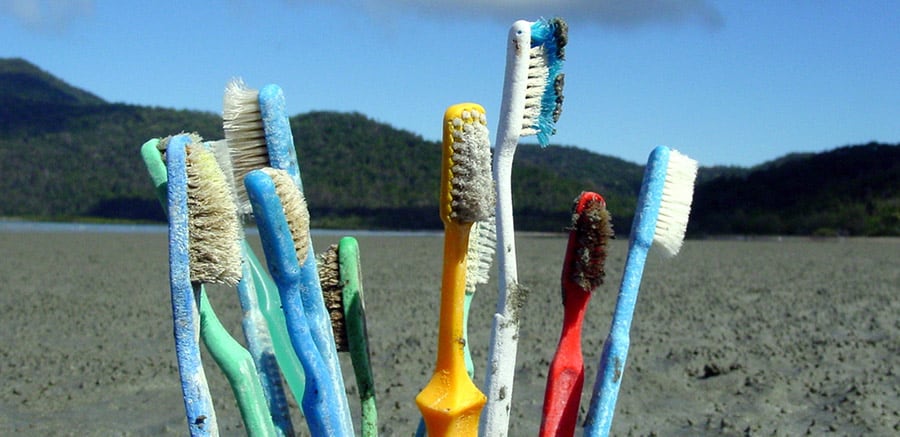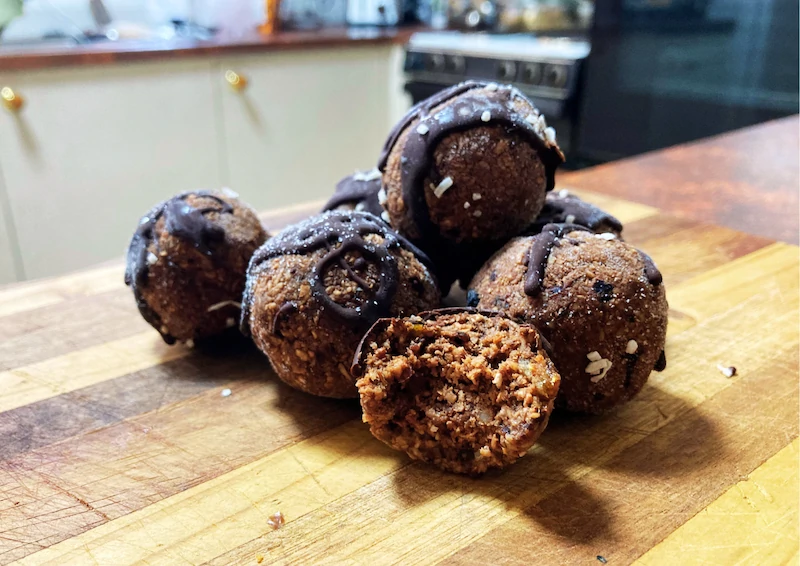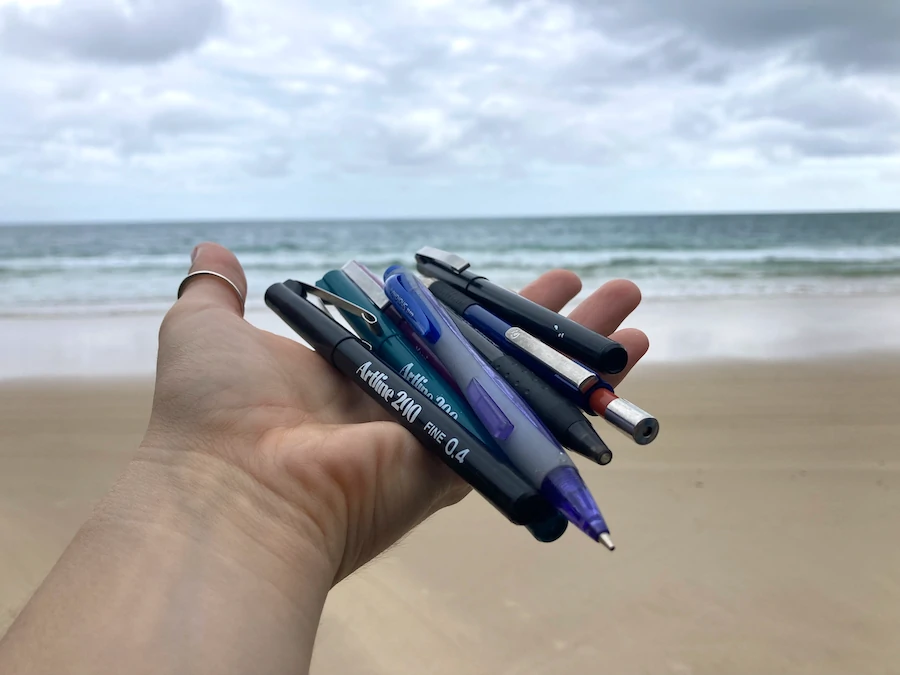
I’ve always used a plastic toothbrush my whole life without any second thought. I used to think I was super conscious of my personal waste in the bathroom but after doing some research on bamboo toothbrushes, I’m thrilled to say I have made the switch from a plastic to a bamboo toothbrush right reasons.
So why should you switch to a bamboo toothbrush? Bamboo toothbrushes are an eco-friendly alternative compared to their plastic counterparts. Bamboo is a renewable and sustainable resource will help eliminate your plastic waste in the environment.
It’s safe to say that nowadays we are all aware that our excess waste is a detriment to our beautiful planet. With more research, I’ve realized the damaging ripple effect that specifically plastic waste can have on our environment. By switching from a plastic to a bamboo toothbrush you’re taking the first step in a solution to our global waste problem.
Why Make the Switch
Switching from a conventional plastic toothbrush to a bamboo toothbrush is one of the easiest things you can do to immediately reduce the plastic waste in your bathroom. I made the switch over three months ago and couldn’t imagine ever going back. There are several reasons why I decided to make a simple switch from plastic to bamboo.
Over 4.7 billion plastic toothbrushes worldwide, are dumped in landfills and oceans every year.
These numbers are staggering! Not only is this plastic going into our land but also our oceans. It is now believed that there are 5.25 trillion pieces of plastic debris in the ocean with our marine life being directly afflicted. Nearly one million seabirds and 100,000 marine creatures die from plastic ingestion yearly and those were just the ones that were found.
Modern toothbrushes are made from a variety of different plastics including high-density polyethylene and nylon, neither of which are biodegradable. Bamboo toothbrush handles take only around six months to compost, while a plastic one takes hundreds of years to fully break down.
Bamboo is a natural plant that is fully biodegradable and can sustain rapid growth by up to three feet (1 meter) a day for some species. Known for being a tough plant that can survive against nature’s harsh conditions, it has natural antibacterial properties that aren’t destroyed during the manufacturing process of the toothbrush.
Bristles on bamboo toothbrushes should be BPA free. BPA (or bisphenol-A) is a chemical found in many hard plastics. Based on animal studies, the FDA has placed concern about the potential health effects of BPA. BPA-free non-plastic nylon bristles on your bamboo toothbrush will not give off any toxins when disposed of.
When purchasing your bamboo toothbrush, look for bristles that are made of Nylon-4, a petroleum-based plastic that is biodegradable under certain conditions. Even if you cannot find Nylon-4 bristles, you are still taking a huge step towards reducing your plastic waste in the environment.
Do your homework and make sure your bamboo toothbrush is packaged with biodegradable eco-friendly cardboard that is just as environmentally-friendly as the toothbrush itself. After all, it wouldn’t make sense to swap a plastic toothbrush for a bamboo one if the packaging is just going to add more waste to the environment!
What Your Current Plastic Toothbrush is Doing to Your Mouth and the Environment
Brushing your teeth should be something that promotes good health, however, regular toothbrushes are made of BPA or PVC based plastic for the handle and bristles, which can leave toxic microparticles of plastic in your mouth. No thanks!
It may seem perfectly normal to rub chemicals across our teeth with plastic instruments, but it hasn’t always been this way. Long before toothbrushes and toothpaste, people used rough cloths or twigs and water and rubbed salt and chalk across their teeth to get rid of the dirt and grime.
Now no need to go out and start foraging for twigs in your backyard! We have since advanced as a society due to technology but plastic toothbrush waste poses a huge problem for our environment. Here are a few unfortunate things we are doing every time we throw away a plastic toothbrush:
- Making the problem worse – according to FOREO, 50 million pounds of toothbrushes are added to USA landfills annually. Many manual toothbrushes are now produced with larger handles, so the amount of plastic in landfills will only increase.
- Using non-renewable energy – plastic toothbrushes are made from polypropylene plastic (handle) and nylon (bristles), which are both sourced from non-renewable fossil fuels.
- Contributing to greenhouse gases – manufacturing nylon creates nitrous oxide, a greenhouse gas that is 310 times more potent than carbon dioxide.
How to Care for and Dispose of Your Bamboo Toothbrush
The great part about a bamboo toothbrush is that it requires very little extra care than that of its wasteful plastic counterpart.
- Dispose of packaging – make sure you purchase a bamboo toothbrush with compostable or recyclable packaging
- Keep dry – a quick wipe with a dry towel after use will ensure the longevity of your bamboo toothbrush. Store upright in a clean glass container just as you would with a plastic toothbrush. You may notice the color of the bamboo around the top portion that goes in the mouth or the handle become a little darker or lighter but don’t worry, this is just the sign of a well-cared and loved toothbrush.
- Upcycle – try to reuse your worn-out bamboo toothbrush before recycling it. Old toothbrushes serve as great scrubbers for cleaning the grout in showers, rubbing the stains out of clothing, and polishing up the faucets and drains in the bathroom.
- Remove bristles – before you put your bamboo toothbrush in the compost, make sure you remove the bristles. When I removed them for the first time I thought it was going to be difficult, but I’m no handywoman and this was a breeze! Simply grab a pair of pliers and pull the bristles out small section by section. With a secure grip and strong pliers, the bristles should slip out easily. Make sure all the bristles are removed before composting.
- Compost – once you’ve removed the bristles, it’s time to compost the bamboo handle. If you compost in your backyard I recommend breaking up the handle a bit with a hammer before depositing. The bare toothbrush handle should return to the soil within six months’ time. Unfortunately, the nylon bristles are too small to be recycled so they will have to be put in the trash. In total, this will result in less than .01 ounces in plastic waste which is a massive improvement from plastic toothbrushes.
Related Questions
Where can I buy a bamboo toothbrush? Most online retailers carry brands of bamboo toothbrushes. Most come in packs of two or four sometimes with a storage case. Make sure your bamboo toothbrush comes with compostable or biodegradable packaging.
Are bamboo toothbrushes good for your teeth? Bamboo toothbrushes have all the same great properties as plastic toothbrushes when it comes to caring for the health of your teeth. Bamboo is antibacterial and may even last longer than your standard plastic toothbrush.
How long do bamboo toothbrushes last? With proper care, a bamboo toothbrush can last just as long as a standard plastic toothbrush. The American Dental Association recommends replacing your toothbrush every 3 months or when the bristles become frayed.



